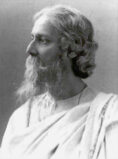TRANSLATED FROM THE BENGALI BY ARKADEV CHATTERJEA
Poem No. 75 of Sphulingo Songjojon
He passes his days bearing a light load;
For worries to appear – he never gives scope!
His resources are scant, and he owes debt –
Yet he likes not to blame his fate.
The neighbours hurl their harshest comments,
He replies silently with a smiling indifference.
At the time of his birth, he got this gift:
To be amused at the mockery on his broken life heaped.
The Drummers Beat Upon Their Drums by Canals and Swamps
(A translation of “Dhakira Dhak Bajay Khale Bile” from Akashpradeep)
A poem by Rabindranath Tagore on rape and death of a girl, the society’s impotence and indifference, and a rhyme that had sunk into obscurity taking a strange relevance when connected with the personal.
(Composed on 28-3-1939)
In Pakurtoli’s field
On Bamunmara Lake’s shore
When the primal grandmother’s disciple in the sky
During a sunlit afternoon,
At a corner of the purple-golden horizon
Sits and spins on yellow-coloured dry grass
A coarse mat, and spreads it over the earth.
From there, comes to my faded memory’s ears
Amidst drowsy sunlight
In a singsong tune —
“The drummers beat upon their drums by canals and swamps,
We gave away the beautiful girl in marriage to the robbers.”
I cannot visualize this terrible rhyme from a distant time
Clearly anymore, the image has faded.
Its stab does not pierce my mind
Time has stolen the value of its pain.
On the way to her marriage, robbers abducted the girl –
This news is less exciting than a dry leaf
Lying on dust, like swept-away refuse.
Unbearable days, filled with sorrow,
These words, perchance, are all that remain,
Deceptive as ashes after the fire has died out.
That forgotten day, tugged by today’s news
Arrives in the living present.
The hot air’s hawk repeatedly
pecks at this rhyme,
And places bits and pieces of this sound
Between disorderly thoughts.
In the awakened mind, a fog spreads in dreams,
Stifles sleep with a smoky blanket,
Dances in the blood, mingling with this poem’s rhyme –
“The drummers beat upon their drums by canals and swamps.”
The zamindar’s old elephant waddles towards the bamboo grove,
Ding dong swings the bell on its neck.
At the touch of the afternoon light’s soft glow
I wake up from cloudy-coloured lazy idleness.
I suddenly feel a pang in my breast,
Under the ribs, a pain hurts.
As if a jab breaks my reverie,
Where is our neighbourhood’s dark-skinned girl –
Who used to bring a basketful of parched rice and rose apples
Insignificant were their prices.
She used to bring sweet and unripe mangoes from their trees,
Instead of one anna, I used to give her four.
I hear blind, old oil-maker woman’s cries –
Some days back, a headstrong murderer
Had abducted her youthful granddaughter
And fled, who knows where.
Today, we heard from the watchman,
Her youth had been crushed, and her life had ended.
Such heart-wrenching news ties up
With that trivial rhyme from a distant time.
Scripture-abiding faith falls into the dust,
“There’s no recourse, no remedy,” reverberates in the sky.
Sounds from ancient times mingle with the poem’s rhyme –
“The drummers beat upon their drums by canals and swamps.”
The zamindar’s old elephant waddles towards the bamboo grove,
Ding dong swings the bell on its neck.
Also, Read Selected Poems From Sovraliminale By Francesca Del Moro, Translated From The Italian By Patrick Williamson and published in The Antonym:
Follow The Antonym’s Facebook page and Instagram account for more content and exciting updates.




























0 Comments